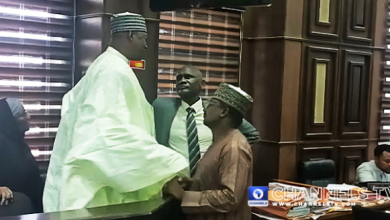Former GOC warns Nigeria’s security crisis worsening due to troop shortage

Retired Major General Danjuma Ali-Keffi, former General Officer Commanding (GOC) of the Mechanised Division of the Nigerian Army and current security strategist, has raised the alarm over Nigeria’s deteriorating security situation.
Speaking in an interview with Arise News on Wednesday, Ali-Keffi linked the country’s surge in mass abductions and killings to insufficient troops, low morale, and an apparent lack of political will at the highest levels of government.
Using the recent Kebbi State abduction as a case study, the retired general criticised the government’s handling of security operations.
“This is a surprise. I’ve been on your show since January last year—two years now, calling for sufficient troops. I kept calling for replication of what Sri Lanka and other countries have done.
” But I think we have a government that is funded… this is a succession of failures,” he said.
Ali-Keffi also criticised the cabinet and security leadership, asserting that recent changes of service chiefs were largely cosmetic.
“You can bring a famed German general or Patton or Rommel; it won’t matter because the political will is not there.
‘:The military and other agencies are insufficient. You can’t expect them to be everywhere. That’s the fact,” he said.
Highlighting troop inadequacy, he noted that proposals by members of the National Assembly to increase the military by 100,000 personnel were coming too late.
“Nigerians are fed up, frustrated. The country is a killing field,” he added.
On the nature of the recent attacks, Ali-Keffi clarified that these incidents are primarily financially motivated abductions, rather than ideological insurgency like the Chibok kidnappings.
Reflecting on his own experience, Ali-Keffi described the alarming depopulation of towns in northern Nigeria.
“I grew up in Makati, Benin State. Many areas I knew are now empty. My friends, their families are killed… troop numbers were inadequate.
”Commanders have to move troops like you move people in farming or shipping to cover areas. But you cannot achieve this,” he said.
He also stressed the limitations of intelligence without actionable force: “Good intelligence is useless if you cannot influence action on the ground.
” Sometimes troops are aware that Boko Haram is going to attack a location, but the resources aren’t there.
”Troops come from other locations to respond, which exposes other threatened areas.”
Ali-Keffi also highlighted troop fatigue and morale challenges, citing decades-long military deployments since the Liberian crisis of 1990–91, which he said have deeply affected soldiers and their families.
“Troops I commanded in Konduga and other locations are still there, repeatedly serving in dangerous theatres.
” Family lives are being destroyed. Soldiers are victims of leadership failure,” he said.
On the issue of government leadership, Ali-Keffi was candid: “The leadership does not display much concern. People are being abducted and murdered in their thousands.
”The government circus continues regardless. Politicians don’t care. That is why threats from foreign nations are now prompting action. Nigerians are frustrated because their lives are devalued.”
Regarding a path forward, Ali-Keffi rejected negotiations with criminals.
“Negotiation is out of the question. No dialogue with criminals. Forests and deserts used as hideouts must be cleared.
”Sri Lanka took decisive action. Action is needed now to prevent turning Nigeria into a failed state. Things are degenerating every day. We must act decisively,” he added..
Ali-Keffi’s remarks underscored a growing concern among security experts that without adequate troop strength, improved morale, and decisive political leadership, Nigeria risks continued escalation of violence and insecurity.



